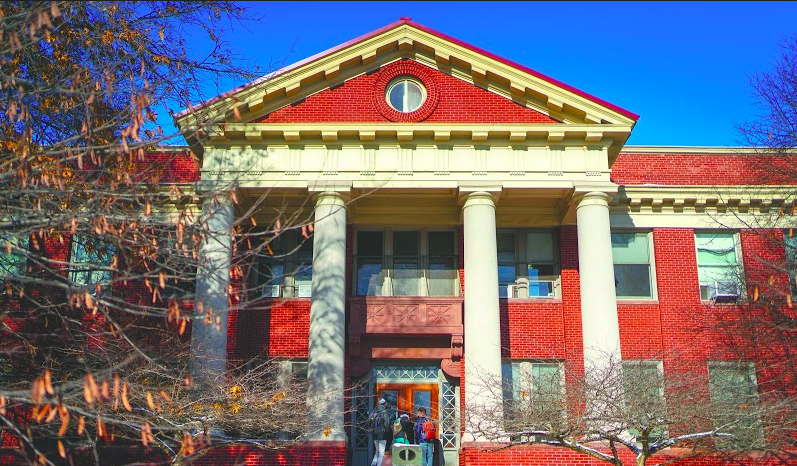There’s an old Tumblr meme that goes something like, “we’re all living in the paragraph in the history book titled Factors Leading To.” In recent months and weeks, the sentiment has grown more acute. It’s less funny now.
Every senior lived the history of these four years. We watched the 2016 election results projected in Sayles; we protested the Muslim ban and family separation. Qasem Soleimani was assassinated, DACA eliminated, and Trump impeached (but not removed). America led the world in COVID-19 infections and deaths. This week, police rioted violently against mass peaceful protests of the May 25 murder of George Floyd.
Time seemed to freeze and hurtle past, by turns. The sense that we were living in crisis always grew. On March 11 of this year, at 5 p.m., I turned in my comps (a graphic memoir inflected with environmental history) in Laird. My reading group popped champagne (the cork shot high up into the stairwell), drinking from plastic glasses on the landing as the sunset lanced through the windows. It was a jubilant and fragile moment. The group dissolved. Dylan and I took the long way to Basil’s. It was really, really busy, I remember.
The next morning Spring term was cancelled. The brief calm broke permanently into chaos. My partner and I drove to Illinois, packed up their apartment, and then to their parents’ home in rural North Carolina. I haven’t been in a restaurant since then.
As seniors, the time we lived through was a disturbing backdrop against which to complete an undergraduate degree. It challenged many of my friends to change priorities; to begin studying theories, histories, and literatures of Blackness, queerness, radicalism, oppression, imperialism, colonialism, and liberation. This moment didn’t invite so much as it demanded that shift of us.
Much of that education happened informally for me: at Democratic Socialists of America (DSA), Divest, and #CarlsTalkBack meetings, reading clubs, comps talks, group chats. It was off-campus sometimes, at union protests, with bartenders and baristas, brunch shifts at Dacie’s, at St. Olaf demonstrations. Some took place formally as well, thanks to radical professors of color and allies.
That crucial education so often occurs at the margins because the liberalism of our capital-L liberal arts college—of incrementalism, bipartisanship, and civility—is an institutional arm of hegemonic power. As such, it only represents those ideas reluctantly. That liberalism is currently defunding Africana, Women’s and Gender, and Ethnic studies programs at universities across the country, while happily training countless future employees of the tech giants, defense contractors, and industry groups creating an ever less just world. The same liberalism is represented by the many Democratic elected officials currently dispatching murderous police against peaceful protestors, and by the febrile Democratic presidential nominee who this week suggested that police “shoot ‘em in the leg instead of the heart”. In other words, it collaborates with fascism, and it must end.
Though countless countries released prisoners due to COVID-19, the US mostly didn’t, despite having the world’s largest incarcerated population. In April, eight of the ten largest COVID-19 hotspots here were American prisons. While we have attended Zoom classes, places like immigration jails, Amazon warehouses, and meatpacking plants have been sites of unimaginable horror. At the mercy of unemployment levels unseen since the Great Depression, workers have been forced to risk and lose their lives for the unlivable federal minimum wage.
That is our normal. As inheritors of indigenous genocide, American slavery, and the hundreds of years of injustice that followed—particularly, as mostly white, wealthy students—we must reckon with this history. We must break with it, materially and politically, and that takes more than good intentions and well-chosen words.
As members of a strange and beautiful community during a strange and terrible time, many of us graduating in 2020 experienced coequal personal and political growth during our four years. I know I did. The 20-year old first-year Me was chronically depressed, working too many hours at my off-campus job, scared to leave a long-distance relationship, afraid of building authentic connections. He spent the next three years in off-campus housing, got out of that relationship, joined the Occupy ICE protests in Portland, and switched majors twice. He will study in London and France, intern in Alaska, grow close to housemates, question his gender identity and presentation, and learn so much from generous peers and professors.
I would never want to be him again. The growth I experienced, even as a white cishet student with resources, was too painful and valuable. As a society fighting diseases metaphorical and literal, we too must leave the past behind, and bury all its ghosts—capitalism, prisons and police, land theft, private healthcare, corporate control. The transformation will be painful, but the alternative is unthinkable. We can never return to normal.










